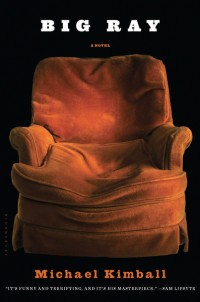 Big Ray
Big Ray
by Michael Kimball
Bloomsbury USA, 2012
192 pages / $23.00 buy from Amazon
1. Big Ray blends genre between flash fiction and novel.
2. Each chapter within the work is told in first person confessional episodic moments, which read as a short flash fiction piece which could be read on its own as a complete story.
3. Each of the flash sections rarely surpass 200 words, though the sizes ebb and flow throughout.
4. Kimball heightens intensity by elongating the more anxiety-ridden sections of the book and in parallel compresses the sections which give appropriate if not beautifully told anecdotal backstory. In doing so, Kimball is showing his expertise as the mark of his incredible ability to craft story.
5. Michael Kimball is one of the nicest guys as a person in “the business.” Also, he can write. Dude can write.
6. Kimball is opening the reader to a complicated familial past quickly.
7. We are witness to Big Ray’s past and the way in which his ether has an everlasting effect on our narrator. As our narrator walks between Big Ray’s passing and their intertwined past as father and son Kimball provides us with generously rendered unfolding history, and in doing so, illuminates a thick, vastly layered novel which reads painfully, slowly, like ice melting in the most profound way possible.
8. “It makes him look as if he’s about to do some damage.”
9. Heartbreakingly, there is a kindness at work, a tongue in cheek commentary about the ways in which people, motivated by their own intentions, are terrible to one another, observe:
“Here’s what happened: After high school, my father went into the Marines and my mother went to college. My father lived in the barracks with dozens of other men and my mother moved into an apartment with a roommate who she didn’t know particularly well. To fill in the space between them, my mother and my father wrote letters to each other for months.
Then, without any explanation, my mother stopped receiving my father’s letters. Not long after that, my mother stopped writing letters to my father. Neither one of them knew what had happened. They both waited for months, thinking the other one had stopped writing.
What my mother didn’t know was that my father was still writing her letters. What my father didn’t know was that my mother wasn’t receiving the letters. This was because my mother’s roommate would come home to the apartment at lunch and steal my father’s letters.”
10. A part of the pain our narrator endures is a sense of trying to explain this narrative to himself. Which, is brilliant in that Kimball writes a guy who walks the line between reliable narrator and human being. He wants love, attention, appreciation, but imposed a sense of failure on himself, which leads to resentment and anguish again. What Kimball can do is paint, for any person, the pain felt in never really connecting with a parent, yet simultaneously connecting with a parent by default.
“My father’s life was an ordinary one in so many ways. I wonder if I am making him into something more than he was because he was my father.”
11. It’s as if Kimball has held on to every moment he’d thought he’d forgotten about, and walks us through the steps of mourning. This is a stark and elegant read for anyone who remembers what it feels like to want for approval while receiving disapproval.
12. This is a book about the way people miss one another in all of the ways one can. Someone said that to me once, that fiction is about all the ways in which people miss each other in every sense of the word. See me saying to you: “What I missed that, say it again, please I am asking you to say it again to me. I miss you. I miss that time you said that thing. I missed the boat.”
13. Kimball’s choice to tell a story about people motivated by their own minds wholly in a first person, casual narrative is an artistic triumph of a choice, paradoxical and providing a sense of: I can do it better.
14. We walk with our guy as he braves the motions of a postmortem time period, and he unfolds his understanding of the story with us.
15. The thing about this kind of first-person narrative exposition is that it works when Michael Kimball does it.
16. Kimball has this way of taking men to a place where appreciating their ability to feel is masculine, because it’s brave.
17. I think that Michael Kimball is a brave writer.
18. I think that Michael Kimball asks his readers to remember that they are brave.
19. I think that Michael Kimball reminds his readers that they are brave.
20. I think that you should listen to Angry Son by Orchard while reading this book. Here it is: http://www.youtube.com/watch?v=WS268xriQlo
21. I think that it is hard to be happy in life.
22. I think that you should try somehow to be happy in life.
23. I do not think being happy is for stupid people or for artists who are not real artists.
24. I think that I used to think that.
25. I think that we all need another book from Michael Kimball.
Tags: 25 Points, big ray, Bloomsbury, michael kimball

Is there anyone that finishes a book by Michael Kimball and doesn’t think “I wish he was my best friend”?
17 through 19. Yeah.
Love 25. It’s how I feel immediately after all of his books.
This makes me want to read this book.
finished US laying flat on my futon and holding back what tasted like tears. michael kimball writes about people the way he does, i think, because he cares about them and wants everyone to be happy while it’s still possible.